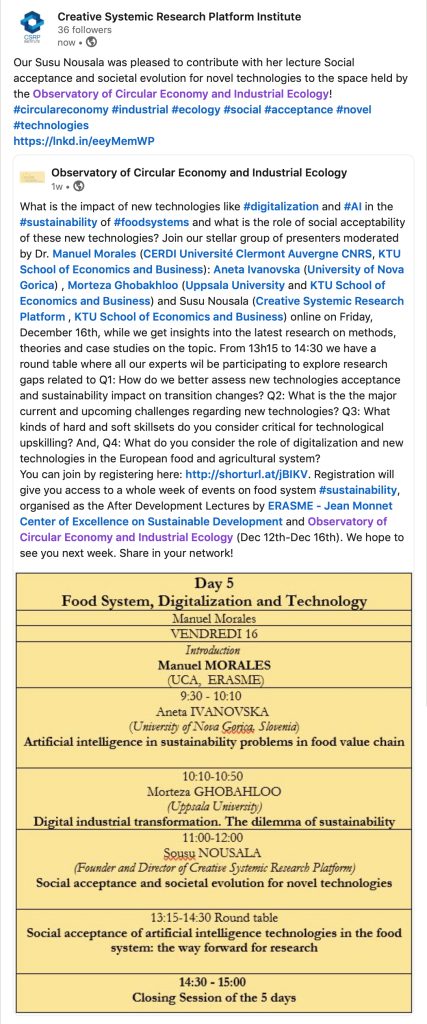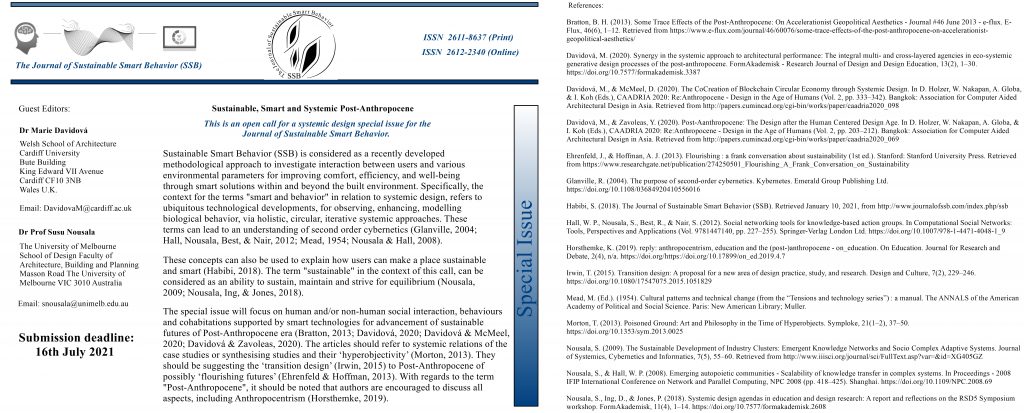Our Susu Nousala was pleased to contribute with her lecture Social acceptance and societal evolution for novel technologies to the space held by the Observatory of Circular Economy and Industrial Ecology!

Our Susu Nousala was pleased to contribute with her lecture Social acceptance and societal evolution for novel technologies to the space held by the Observatory of Circular Economy and Industrial Ecology!

David Ing lecturing on “Knowing Better Via Systems Thinking” for Ryan Armstrong, Ph.D. third year class on International Operations Management at Universitat de Barcelona Business School.
Access to the lectures:
2022/10/10 Knowing Better via Systems Thinking: Traditions and Contemporary Approaches
CSRP Institute Symposium 2022 call collected nine Thought Pieces! The discussion schedule of the thoughts follows below:
Thu, Oct 6 (Spanish time currently CEST)
10.00 – 10:10 am: Welcome & Introduction
Slot 1: Susu Nousala, Creative Systemic Research and future developmental directions, Publication and Communication thought piece
Slot 2: Marie Davidova, The Systemic Approach to Architectural Performance (SAAP)
12:30 – 14.00 pm: Lunch Break
14:00 – 14:05 pm: Brief Summary of the morning thoughts
Slot 3: Thomas Marlowe, Integration & Dis-Integration
Slot 4: Petra Johnson, the matter ecologic
Slot 5: Dan Zhu, Patterns methods: design future hybrid spaces for creative learning and working
17:00 pm: End Thursday session
Fri, Oct 7 (Spanish time currently CEST)
10:00 – 10:10 am: Brief Summary of yesterday thoughts
Slot 6: Yi-Heng Cheng: Prosperity in Resilience
Slot 7: Marco Cataffo: articulating design decisions post-consumerism
12:30 – 14.00 pm: Lunch Break
14:00 – 14:05 pm: Brief Summary of the morning thoughts
Slot 8: David Ing, Systems changes as when+where: Crossing thresholds or animating propensity?
Slot 9: Jelena Sucic, What/How/Why makes us move forward? The Nature of Behaviour
16:00 – 17:00 pm: Summary discussion per each speaker and end Friday session
Learn more about the call
To partecipate in the discussion contact us via email and we will share the zoom link with you
We are happy to present the Call and Agenda of our 2nd Symposium! This year, the modality changes with a format that favours discussion. We will be connecting from Mòra d’Ebre, Spain, on the 6th,7th, and 8th of October 2022!
The call is open to all! You are welcome to submit a thought piece and/or simply join the discussion process. The intended theme has an intentional broad area of interest, to reduce limitations for participants and potential project development. Topics could for example include technical/engineering, cultural heritage, any type of social adaptive structures and related topics
Creative Systemic Research Platform, the Concept
What do we mean by creative systemic? This area of research has been on-going, developing (through various stages) over the past 15+ years, specifically targeting the concept of tacit knowledge network dynamics as related to systemic structures. The structural dynamics exposed a very creative aspect of this research approach. The creative could be found embedded in the creation and engagement of the multitude of relationship dynamics and interaction between all (including elements, actors, levels, layers and the like).
So what are examples of the all important emergence of these structural dynamics and their rhythms, patterns and behaviours? The terms multi, trans, inter, intra, poli – disciplinary approaches have been in discussion for many years, but the way in which identification, discussion, engagement and conceptual development have evolved highlights the continuation of vigorous debate within these various contexts. The development of a “platform” is not a new concept but it remains an important one, and has proven to be a critical methodological approach to support any nexus of various contexts at play, typical for creative systemic research. Now more than ever, the capability of developing and delivering a wide range of learning systems has become a necessary skill set. The successful engagement with any learning system has become critical, for in depth understanding of the way we are, and how we are living and existing within our immediate environments. This also extends to include the relationships that link us between the urban, peri-urban and rural environments.
The Symposium Format and Submissions
This discussion invites thought pieces or extended abstracts or academic posters (aim for half to one page) that expand on the bottom up, the nexus of disciplinary approaches, including cases that discuss thinking and practice, from any type of interactive project/performances or processes, case studies through to field
experiences.
We will ask you to send in your submissions and your preferred working titles so that we can schedule your presentations to our colleagues for digestion before the symposium begins. These thought pieces will create a type of table of contents for open discussion, with a view to exploring the relationships with the concept of creative systemic research and practice. The presented concepts/thought pieces have the possibility to go through the multimedia publication process, with a publication date planned for October/November 2023.
The publication process will be presented at the symposium as a thought piece and part of the introduction for the Symposium.
Send submission pieces to csrp.institute@gmail.com
Subscribe for attendance and participation in the discussion at csrp.institute@gmail.com
The zoom link will be sent before the start for the online attendance.
Agenda Symposium 2022 (CEST, UTC +1)
October 6th:
10 am – Welcome and introduction
10.15 am – Presenting the thought pieces (approx. 10 mins each, including any current Australasian colleagues)
12.30 pm – Lunch
14.00 pm – Open discussion and formulation of tacit table of contents for topic relationships (also any
presentations from our current our Canadian and U.S. colleagues).
17.00 pm – End of formal discussions.
19.00 pm – Dinner
October 7th:
10 am – Summary of previous discussions (including any current Australasian colleagues)
12.30 pm – Lunch
14.00 pm – Open discussion and formulation of processes for topic continuation into next year 2023. (also
summary discussion with current our Canadian and U.S. colleagues).
17.00pm – End of formal discussions.
19.00pm – Dinner
October 8th:
11.00 am – Summary and closing comments for CSRP Institute Symposium
12.30 pm – Lunch
14.00 pm – AGM meeting
15.30 pm– Closing of the AGM for 2022.
We are happy to announce the CSRP Institute’s First Symposium program, keeping in mind the current restrictions, we have figured out a time and place where at least some of us will manage to gather together on the 7th November 2021 from Bruxelles!The intent for this year is to have a small gathering to catch up on research and projects, and to more easily organise the CSRP Institute’s next steps. The participation is open also to interested non-members within this years limited holding capacity. We have programmed 7 short talks within the Symposium’s theme “Diversity in systemic practice and thinking” from people among us, including of course an Open Discussion session in the afternoon. All of them will be accessible from a Zoom meeting link you will receive for participation.
For more info or to register
21 October 2021
The Superficiality of Design
Skin deep, deep skin
Guest Lecturer: Dr Susu Nousala
‘The Art of Systemic Learning and Practice‘
Transdisciplinary Design is to address this problem and to
empower the students to have a wider, stronger, richer
knowledge in design and design related disciplines so they
can make cross reference from a wide spectrum of knowledge
when confronted with complex academic and professional
design issue or task.
Timothée Landa, young researcher has grown his capacity and interest in systemic thinking, social-ecological systems and community resilience by concluding a 6 months intership period by researching in practice and writing his master thesis.
In the context of our main practice base at the growing farm, in the area of Terre d’Ebre, Spain. Timothée identified a water and growth pressure in the Priorat comarca and recognised the social mechanisms of resilience responding to the pressure. The research included landscape observation and mapping and exploratory and targeted interviews with the inhabitants of the village of El Masroig who participated and welcomed the investigation with sheer enthusiasm and benevolence.
Master thesis proposal
Social mechanisms of resilience and time lags in the Social-Ecological System (SES) of Priorat
Master Candidate Timothee Landa
Political Sciences, Agro Paris Tech, Governing the Transition, Ecology and society; Sciences Po Saint-Germain Germain-en-Laye, timothee.landa.1220@gmail.com
Under the supervision
Professor Susu Nousala, Co-president CSRP Institute
Doctor Cécile Ferrieux, Senior lecturer University of Agro Paris Tech
Professor Cécile Blatrix, Professor University of Agro Paris Tech
The main objective of this research is to analyze the agriculturally based social movement impacting the preservation of the environment through a social movement that has maintained a sustained campaign of “claim making” (Tilly et al. 2009). The study considers the main actors of the social mobilization as agents of the socioecosystem of Priorat. Those social agents are the actors of the mechanism who perform actions contributing to resilience of the socioecosystem. We focus on the mobilization over the Siurana river derivation, the Siurana river being one of the main river of the comarca of Priorat which is the 2nd smallest administrative Spanish territorial division. The derivation of key water sourcestoward another water basin incombination of the emergence of Climate Change’s consequences are currently putting the region under a high level of hydric stress. The issues related to this derivation are threatening not only the environments but also the livelihood of the inhabitants, for most of the economy is based on agriculture. As such, investigating the roots of the mobilization could help disclose the symbiotic relationship between the inhabitants of the comarca and their biotic and abiotic environment. This study focuses on the comarca of Priorat as a whole.

For more information or to get access to read the full work contact us
New submission deadline for this open call for a systemic design special issue for the Journal of Sustainable Smart Behaviour.
Submission due to 30th November 2021
Full information below
Rather than a top-down abstract approach to #SystemicDesign, #CreativeSystemic Research builds bottom-up with communities in a longitudinal appreciation of learning. Susu Nousala and Jelena Sucic session with #SystemsThinking Ontario now released at

This is an open call for a systemic design special issue for the Journal of Sustainable Smart Behaviour. Full information below
Notifications